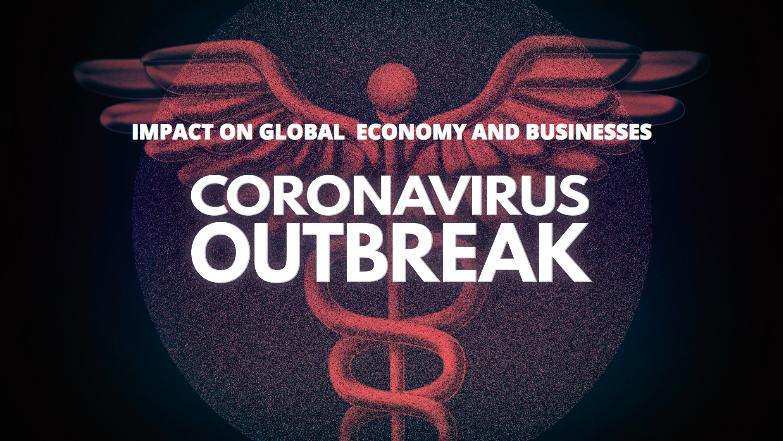AsiaTechDaily – Asia's Leading Tech and Startup Media Platform

AsiaTechDaily Exclusive Coverage – How is Coronavirus Affecting The Global Economy And Businesses?
The novel Coronavirus rampaging across China could have a damaging effect on the Global Economy and Businesses. To date, the virus has infected approximately 40000 people and killed over 1000 people, and this mushrooming disease has now spread to more than 20 countries. Given the fact that China is an indispensable part of global businesses, the ripple effect could be rough and lasting.
Why Is China So Crucial To The Global Economy?
China has grown into the world’s factory, churning out a variety of products for various industries. The country witnessed extraordinary economic growth in the last 40 years and has become the second-biggest economy of the world.
Beijing is the biggest trader of merchandise across the globe. The long-held tradition of sourcing widgets and components from Chinese companies and the growing domestic market of the company has encouraged several foreign businesses to open their factories on the mainland.
Moreover, the country is central to a varied range of global supply chains- most of the world’s raw materials go to China before being transformed into a manufactured product. The last year’s US-China trade war indicates the power of China’s economy to disturb and disrupt the global outlook.
How Is The Coronavirus In China Affecting The Global Economy?
The virus has rattled the global economy, disturbing the supply chains, and shutting down access to a lucrative consumer market. The stock markets in China have become volatile, and the country itself facing an economic slowdown.
The effects of this crisis can be seen across supply chains and industries- automobiles, tourism, entertainment, clothing, luxury, food, and technology.
Effects On The Established Companies
If you look at the effect on supply chains- Airbus has terminated its production line in Tianjin since the travel restrictions imposed by Beijing have hit them significantly. Every month the plant produces six A320 aircraft, therefore, its closure would affect the manufacturer’s jet output. Many other manufacturers such as- Toyota, Volkswagen, and General Motors have also stopped production in China.
Companies such as Disney, McDonald’s, Hyundai, Honda, and Nike over the years have relied on China’s efficient factories and progressively affluent customers. Now, this disease is forcing these companies to restrict travel to China and temporarily shut offices, stores, theme parks, and restaurants. This disruption to Chinese manufacturers has swelled through the global supply chains. As a result, companies are finding it difficult to obtain parts for everything, from cars to gaming consoles.
One of the British’s largest drugmakers, GSK, has 3000 employees across China, and since offices are closed, most of them are working from home. Foxconn, Apple’s chief Chinese supplier, has stopped almost all of its Chines production. Ikea has shut down all 30 stores in China, and Starbucks has closed about half of its 4100 cafes.
Tourism will be the worst affected industry across the globe since the highest number of travelers are from China. According to statistics, there were 150 million people in 2018 who traveled abroad from China. But with this virus outbreak, cross-border travel has totally come to a stand-still.
Royal Caribbean has canceled 8 trips to China and has stopped any passenger who has traveled from, to, or through China. According to the company, these restrictions would cost them $50m of revenue. Cathay Pacific has asked 27000 staff to take 3 weeks of unpaid leave to sail through the crisis. Other airlines like British Airways IAG are witnessing fall in their shares due to flight cancellations.
Effects On Startups
While established and large companies are better prepared to face the financial impact, it is the small and medium enterprises, and startups with less cash on balance may face a more significant challenge.
It is being said that the startups in the retail and tourism sector may be the worst hit. The virus may impact their entire year’s valuation and performance. WHO has declared this as a global health emergency, and with its outbreak, the financial markets across Asia are witnessing a downward trend.
Companies that may not see the light of a new venture capital fund for this year should be prepared for the worst. Startups may have to postpone new businesses to cut costs and increase revenue channels.
Effects On Events And Conferences
This fast-spreading disease has not only impacted companies and startups across the world but has also led to significant cancellations of activities and programs.
Mobile World Congress, the world’s biggest mobile tradeshow, was due to take place in Barcelona on February 24-27. The event has witnessed many cancellations latest being from Facebook and Intel due to the ongoing situation with a coronavirus outbreak.
Two of the most significant art events of Hong Kong- Art Basel and Art Central have been canceled due to the novel coronavirus outbreak. Besides that, dozens of Asia’s conferences, trade fairs have been postponed for this reason.
Two MICE industry trade shows- CTW China and IT&CM China have been moved from March to August. The IELA (International Exhibition Logistics Association) has postponed its Operations Summit 2020, which was to be held in February in Bangkok to later this year.
The conference of the National Association of Travel Agents Singapore has been postponed, which was originally planned for February 2020.
A sports exhibition, ISPO Beijing, scheduled for February 12-15 has been canceled.
The event R+T Asia 2020 will now be held in June, which was originally planned in Shanghai for February 24-26.
According to a report from CAN, Citibank’s largest Asia-Pacific Investors annual conference, which was to be held in Singapore on February 19-20 has been canceled.
The Financial Impact
According to experts, it is being projected this outbreak will reduce the global economic growth in 2020 by 0.2%-0.3%. The disease has surpassed the level of severity of the SARS outbreak in 2002-2003, and this would affect China’s GDP significantly.
However, it’s still too early to assess the complete financial impact of the outbreak of Coronavirus. But many companies have revealed how it is affecting them in varying degrees.
Here are a few of them that we know-
According to a report by CNBC, Disney’s theme parks have been shut in Hong Kong and Shanghai for almost two weeks now, and it is expected that the company’s operating income will be reduced by $175 million in the second quarter.
IMAX, the Canadian film company, has been forced to postpone the release of five movies it had planned to showcase in China during the Lunar Year Holiday period, according to a report by Market Watch.
The American luxury giant, Tapestry claims that their sales could reduce up to $250 million in the second half of the year, according to a report in Businesswire. The luxury cosmetics company, Estee Lauder, has warned that this outbreak would hurt their financial results
Carlsberg is expecting that the Coronavirus would affect their business. However, the company says that it is too early to assess the damage. Tata Motors has warned of a group-wide impact. Besides that, premium alcoholic drink companies like Diageo is still not able to quantify the effect of this outbreak on their business. However, Remy Cointreau warns that there would be a significant impact on their revenue due to its big exposure to China.
The Verdict
The spread of the Corona Virus in China has the potential to cause severe market and economic dislocation. However, the scale of damage can only be determined on how the virus evolves and spreads, which is not possible to predict as of now. Moreover, it also depends upon how soon the Chinese Government would be able to contain this disease and bring normalcy.
According to experts, if the number of new Coronavirus cases begins to slow then, China may reopen its factories. However, with more than 3 weeks into this crisis, there is no sign that the economic impact will ease up soon.





